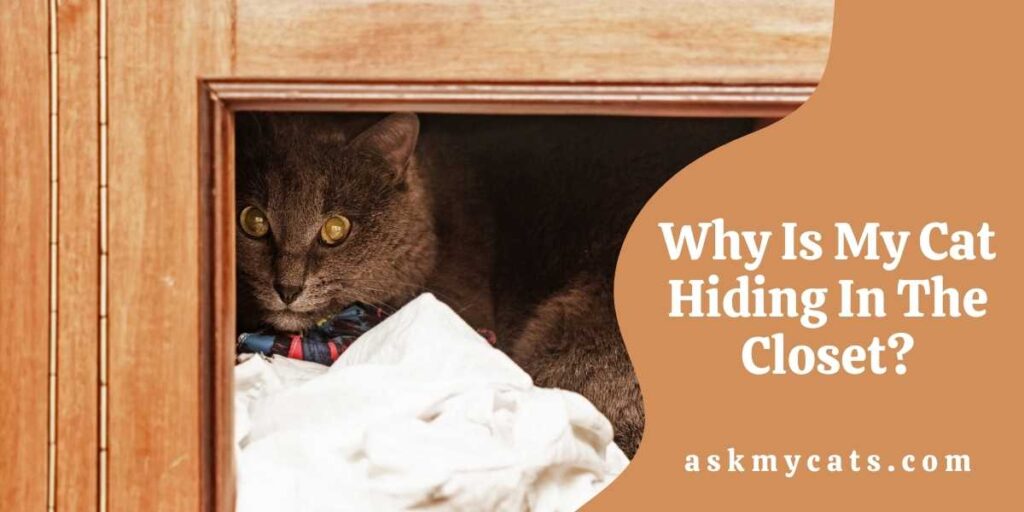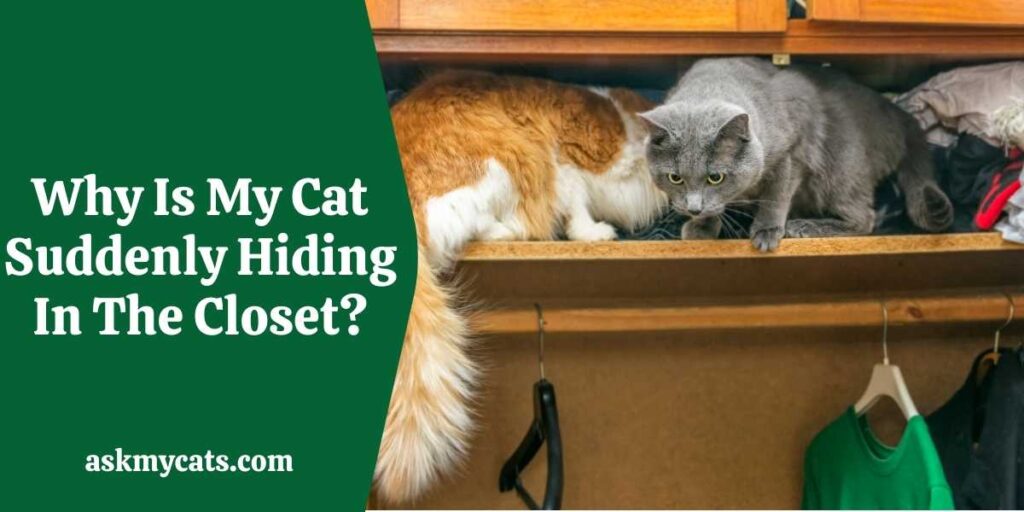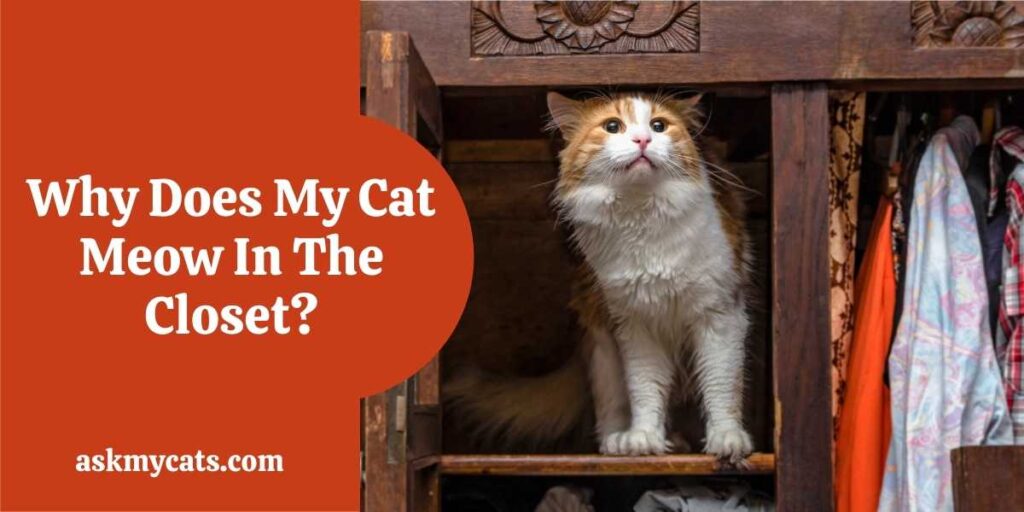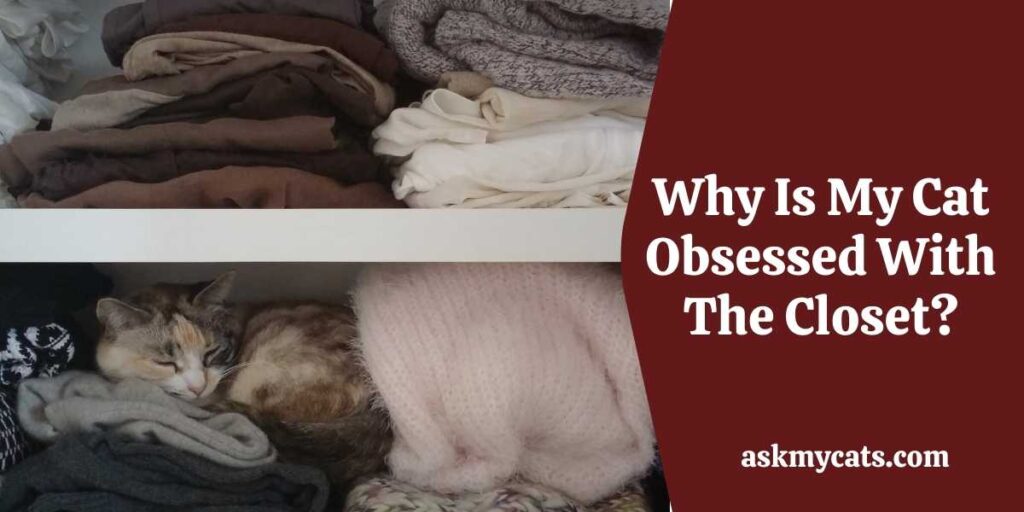Cats hide for a variety of reasons, and most cats consider hiding to be a normal, healthy habit.
In the wild, cats are both predators and prey, and they are instinctively motivated to hide and disguise themselves when stalking a potential prey item and avoiding becoming prey for other predators (i.e., any carnivore that is larger than they are).
Cats prefer to hide in enclosed spaces such as closets because they feel safe and even at liberty. It’s their technique of defending themselves against possible dangers as they sleep.
In this article, I am going to discuss the reasons why cats prefer to hide in closets.


Give Your Cat the Perfect Day
Get the Free Ebook!
Why Is My Cat Suddenly Hiding In The Closet?
Your cat is suddenly hiding in the closet because he is scared of something outside and wants to calm himself.

They are outstanding survivalists, and hiding is one of their most important tools for locating food and staying alive!
Second, hiding in one’s house may be a stress-relieving and calming activity. Many of the sites are warm, dark, and secure. A decent hiding place might provide a pleasant respite from a rowdy family or a nagging dog.
And what cat doesn’t appreciate a private area in which to unwind and take a well-deserved nap?
Third, when cats are sick or not feeling well, they may hide. If your cat begins to hide for lengthy periods of time or modifies her hiding pattern, you should take her to the veterinarian to ensure that everything is in order.
While hiding is a natural aspect of being a cat, it may often become overbearing and create anxiety. Hiding is excessive if it prevents your cat from doing the things he or she needs to do on a regular basis, such as eating, drinking, peeing, and defecating.
If your cat hasn’t emerged from her hiding place to feed in the last day or so, you should take her to the veterinarian.
Similarly, hiding can suggest additional issues, even if your cat is eating and using the litterbox. Behavioral difficulties should not be overlooked; for example, your cat might be hiding as a result of being bullied by another cat.
You’ll need to make supplies available in numerous areas and limit encounters with the bully cat in this situation so that the shier cat may receive what she needs without fear.
This includes boredom-prevention and stress-relieving activities such as playtime and enrichment activities.
Why Does My Cat Meow In The Closet?
If your cat is meowing in the closet, it means he is not feeling well or acting scared.

The more you pay attention to how often and where your cat hides, the better you’ll be able to read her emotions. Any change in your cat’s usual behavior, including the need to hide, should be taken seriously.
As previously said, if a cat is not feeling well or is unwell, it will hide. This might be a protective survival instinct since predators prefer food that is viewed as weak in the wild. If you’re not feeling well, it’s best to hide!
Cats are great at disguising their suffering, so when they start hiding, you’ll want to schedule an appointment with your veterinarian right away.
You may find that your cats hide more frequently at certain periods of the year, or even during the day, based on your observations. Where you reside, your home setting, and your cat’s preferences are likely to influence pattern concealing behavior.
When the family returns home from work and school and the noise level in the house rises, cats may seek out warm locations (e.g., near the water heater or dryer), or if a cat is shy, she may seek out a hiding space.
Furthermore, cats are diurnal animals who are most active at dawn and twilight, when their prey is most active in the wild.
If your cats aren’t bothered by noise and activity in the morning and evening, you could see her playing more during these times and hiding throughout the day or night. Cats may have a favorite hiding area for relaxing and another for fleeing. And these locations might shift over time!
Why Is My Cat Obsessed With The Closet?
Your cat is obsessed with the closet because he feels safe and comfortable there.

In general, the cat guardian has the last say on whether or not to allow a cat to hide in a certain location, as long as it is safe.
If you don’t want your cat to hide in certain spots, attempt to provide them with an option that is similar to the one they are trying to hide in. Do they prefer cramped, dimly lit areas?
Oliver likes to hang out on the second shelf of my linen closet (he opens the sliding door himself!), on top of a stack of clean (now fuzzy) linens, as I said before. I don’t mind if he stays in there since it’s secure and comfortable.
If I wanted to give him another option, I could give him a cardboard box with a sheet inside and store it somewhere close.
Also, check out Cat Peeing/Pooping In Closet: How To Stop Them?
Why Does My Cat Sleep In The Closet?
Your cat is sleeping in the closet because they find the place cool, quiet and dark.
Since closets are dark, quiet, and easy to hide in, cats prefer to sleep in them. In the wild, cats do the same thing, so napping in the closet is a normal reaction to feeling unsafe.
It’s essential to find a suitable cave bed for your cat to solve this problem. These beds include a roof, allowing the cat to relieve the sensation of burrowing into the earth or hiding in a peaceful location near a tree.
For cats who are already acting this way, don’t use a typical cat bed. You’ll have to think beyond the box to find a high-quality cave bed.
To repel cats, do not surprise them out of a hiding location, shout at them, or splash them with water — this will just cause fear, harm your connection with the cats, and cause them to hide. Instead, use a door that they can’t open to restrict access to the hiding area.
If there isn’t a door, employ odors that cats dislike (such as orange, peppermint, and cinnamon) in the area, or lay down a vinyl carpet runner with the nubs pointing up (making it difficult to walk and rest on).
Sticky paws or double-sided tape, applied on inexpensive tablecloths or cardboard and placed in the off-limits area, can also stop cats from napping!
Why Does My Cat Scratch The Wardrobe Door?
Your cat is scratching your wardrobe door to keep her claws clean and healthy.
If there’s another cat in the home or if she can scent cats outside, she may feel compelled to mark her territory. Exercising and stretching her body will help her release pent-up energy.
Some cats claw at doors because they enjoy the feel of them. Scratching removes the outer sheath of their nails, allowing them to brand the object with their scent glands, and allows them to expand.
How To Keep Cat Out Of Closet?
You can keep cats out of the closet by following the following steps:
- Organize your wardrobe. The majority of cats go inside the closet to hide amid the dark mounds of treats; eliminating the piles encourages them to seek out hiding spots with more coverage.
- If the doors don’t close properly or the cat has discovered a method to force them open, use a stick or a measured piece of PVC tubing to hold them shut.
- Spritz the cat once or twice in the face with water. This method necessitates catching the cat in the act, either in the closet or ready to enter it.
- Place dried citrus peels throughout the closet. Citrus, particularly oranges and lemons, are repulsive to cats. Peel the fruit and let the skins dry for a day or two before strategically arranging them at the closet’s entrance and within its depths. A few peels in each corner of the closet, as well as near any clothing the cat may use as a bed within the closet, is a good start.
- Place tinfoil in the recesses of the closet, out of sight of the cat, and step around it. Tin foil is unpleasant to cats’ touch, taste, and odor; bits carefully placed in their favorite closet corners encourage them to seek out alternate sleeping locations.
- Pet repellents should be used. Sprays and particularly designed carpets supplied in pet stores act as deterrents to keep cats out of the closet, but they may not work for all cats because they may be circumvented.
- Treats, for example, can be used to reward cats for basic positive behavior. When you detect them in the closet or attempting to enter the closet, make loud noises like clapping, hissing, or other loud noises.
How To Keep Cats From Opening Closet Doors?
The simplest technique to prevent your cat from opening closet doors is to “child-proof” the door handles by installing an extra lock or changing the type of door handles you have.
One of the most enjoyable aspects of keeping a cat is seeing them investigate and learn about their surroundings. However, your cat may be too smart for its own good at times!
Having a cat who has learned to open doors might be inconvenient, and you may be asking how to stop cats from opening doors.
It may take some ingenuity, but you should be able to devise a cat-proof method.
Frequently Asked Questions
Why does my cat scratch the cupboards?
They do this because the litterbox is valuable real estate in their area, and it must smell like them. It’s a means of marking in an area where they can’t normally mark with pee.
Do cats hide when they are sick?
When a cat is critically ill, it is common for them to hide. They know instinctively that a sick animal is a target in the wild. They’re probably attempting to protect themselves by “hiding” from any threat who would take advantage of their vulnerable position.
When a cat hides what does it mean?
When there’s anything or someone nearby that makes your cat nervous, they’ll hide. They may be scared or apprehensive of something new and wish to get out of the way in case something goes wrong.
Final Words
Hiding in a closet is a natural cat reaction to being worried – they’re physically attempting to get away from the threat – and it’ll most likely go away once your cat begins to relax. Hiding is typically short-lived, so if it isn’t, it’s time to visit the veterinarian.
Ask your questions in the comments section below.
